Best US Options Trading Platforms at a Glance
| Name | Score | Visit | Minimum Deposit | Account Types | Investing Tools | Currencies | Disclaimer | |
|---|---|---|---|---|---|---|---|---|
 | 9.1 | Visitinteractivebrokers.com | General, Corporate, Margin, Stocks & Shares ISA, Professional, SIPP, Joint | Investing Courses, Real-time Signals, Practice Portfolio | 24 | |||
 | 8.3 | Visitwebull.com | General, Margin | Real-time Signals, Investing Courses | 2 | |||
 | 6.5 | Visittastytrade.com | General, Margin | Investing Courses, Practice Portfolio, Real-time Signals | 15 | |||
 | 8.0 | Visitschwab.com | General, Corporate, Joint | Investing Courses, Real-time Signals | 8 | |||
 | 7.5 | Visitavatrade.com | $100 | General, Corporate, Professional | Practice Portfolio, Investing Courses, Real-time Signals | 7 | ||
 | 7.9 | Visitsofi.com | Joint, Professional, Corporate, General | Investing Courses, Real-time Signals, Practice Portfolio | 1 | |||
 | 6.5 | Visittradestation.com | General, Corporate, Margin, Joint | Real-time Signals, Investing Courses, Practice Portfolio | 26 |
Top Options Trading Platforms Reviewed
Overall best Options Trading Platforms: TD Ameritrade
Best Options Trading Platform for Stock Options: Webull
Best Options Trading Platform for FX Options: Interactive Brokers
Best Options Trading Platform for Index Options: E*Trade
Best Options Trading Platform for margin trading: TradeStation
Best Options Trading Platform without commissions: Robinhood
Best Options Trading Platform with low minimum deposit: Fidelity
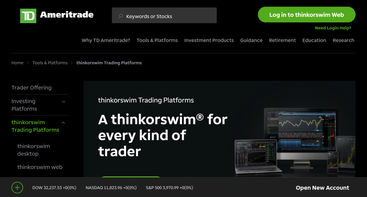
TD Ameritrade sticks out among the crowd by combining a full set of investment products, expansive trading tools, and educational materials in various formats — allowing options traders with any level of knowledge to excel in their craft. The platform also appeals with its no-commission services for US stocks, along with intuitive web and mobile app design offering a rounded experience.
Contract fee for options is fairly competitive for a major trader, and options traders have various tools at their disposal, among which a multi-functional options screener is exceptional. The screener includes capabilities like an iron butterfly, double diagonals, and covered calls, and are highly customizable to cater to various needs.
Moreover, the service is fully regulated by SEC and FINRA and provides clients with the protection of securities of up to $149.5 million.
Webull is among the few platforms offering commission and contract-free trading for stock options. Its intuitive design allows options traders to switch between the markets for optimum strategy monitoring easily.
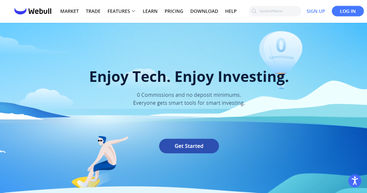
The broker supports various deployment options, including a mobile app, desktop workstation, and web services, but not all services are available on all platforms. It’s not possible to access training materials through the mobile app, for example, and it only allows single-leg options. Yet, the navigation is quite intuitive: traders can access stock-specific information, options, and appropriate chartings on the stocks page. That being said, Webull is far from a full-service broker; it doesn’t feature assets like mutual funds or fixed-income nor supports options screening tools. Options traders can use strategy-building tools to execute the most common strategies and make tweaks along the way.
The platform is regulated by SEC and FINRA and is insured by Apex Clearing. As a SIPC member, its clients are protected against fraud and hacking.
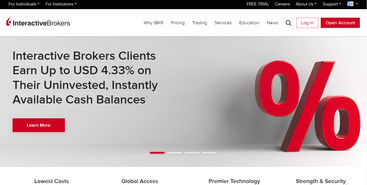
IBKR is among the few forex brokers that accept US clients and offers a breadth of assets, including options, mutual funds, bonds, and futures in 150 markets. As a global powerhouse, its reach to international markets besides the US is impeccable.
It features a rather complex and cluttered interface that may overwhelm a Options trader in their early stages. Rather, it is a platform geared more toward experienced traders with its vast array of tools. Options Traders can compare different strategies on a single template, get an output of different risk/reward ratios, receive tweaking suggestions along the way, and identify low-cost strategies through the Options Portfolio. Also you can find the best trading apps for you specific trading type.
IBKR is fully regulated in the US by SEC and CFTC and is a member of SIPC, meaning that the client funds are insured against hacking and other cyberattacks.

By combining an intuitive design for all deployment models, vast educational materials, advanced tools, and diversity in assets, E*Trade appeals to Options traders from all sorts of backgrounds. The broker allows trading options on stocks, indexes, and futures, and the contract fee goes down to $0.50 when you place more than 30 contracts per quarter.
The outstanding tools include pre-built portfolios, auto portfolio building, and a mobile application geared towards placing options trades called Power E*Trade. Options Traders can choose an options strategy categorized by risk tolerance and market factors, which comes specifically in handy for beginners. Its option screeners are highly customizable for varying needs and feature a Live Activity tool that helps identify unusual options and volatility in the market.
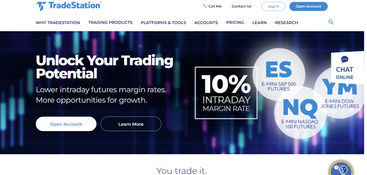
Tradestation offers a breadth of assets to trade, including stocks, bonds, mutual funds, exchange-traded funds, options, and futures, and features a rounded tool for each type of trading. Its options trading tool, OptionStation Pro, helps options traders build a myriad of strategies and provide a visual representation of its risk/reward probability, along with the ability to identify options opportunities. Its margin account comes with a competitive 3.5% interest rate for those who'd like to trade options with trades.
Regulated by FINRA, Tradestation offers a reliable service and set of products. You can access the platform via a mobile app, which also features an app store for related third-party applications, and web services, all of which have very little downtime.
Robinhood pioneered commission-free trading and arguably led trading appeal to a much larger audience over the years, with many platforms following suit. While no fee or minimum deposit structure breaks the entry barrier, its growing library of educational material makes it evermore suitable for traders with little experience.
Moreover, Robinhood supports an easy-to-navigate, straightforward mobile platform. Despite having a website alongside, its mobile version offers a better experience due to its mobile-first approach.
Its straightforward use is perhaps made possible by its limited offerings. It’s possible to trade stocks, cryptocurrency, options, and EFTs, but not futures, futures options, forex, mutual funds, or fixed-income securities.
Regulated by SEC, Robinhood also insures client funds for up to $1.5 million in cash and $10 million in securities.
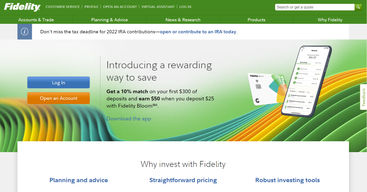
Fidelity offers a rare combination of low-cost service and a myriad of assets to trade, including but not limited to stocks, options, penny stocks, corporate, treasury, and municipality bonds. Executing over 3 million trades daily, it’s among the most beloved trading platforms across the US.
Its options trading section features a rare found for non-automated traders, the ability to backtest options strategies on historical data. This way, you can see how your strategy would perform under past market conditions to assess its potential further. Its screener tool also offers over 200 criteria against which you can generate a list of high-reward potential trading options.
Founded in 1946, the broker’s parent company Fidelity Investments has unparalleled experience under its belt and offers high-level investor protection coverage.
What Is Options Trading?
An option contract allows traders to buy (call) or sell (put) an underlying asset at a specific price on or before a designated date and hold the right to scrap the contract. The option holder (the trader who buys the contract) pays a premium to the options writer (the trader who sells the contract). Note that premiums are multiplied by $100, the multiplier for standard US equity options contracts. So an option's premium of $1 is really $100 per contract.
Much like stock trading, platforms offering options trading may charge for their services through commissions or fees per contract.
How to Start Trading Options on Online Platforms in the US?
Here’s a step-by-step guide on how to start trading options, using TD Ameritrade as an example.
Step 1 — Apply for an Options Trading Approval
Step 2 — Analyze the Options
Step 3 — Choose the Expiration Date and Strike, and Place the Trade.
Types of Options Trading in the US
Besides differing strategies, there are also different forms of options trading offered by trading platforms in the US.
Options Leverage and Margin Trading
When selling an option, brokerages may sanction off a chunk of the seller’s funds as collateral to cover the risk, and those funds would come from a margin account. Margins apply only to certain types of strategies, like naked puts, and are not required for all options trading. FINRA sets the minimum margin requirements in the US, but platforms may add to them. The list below lists the platforms with low-margin requirements.
# | Brand |
|---|---|
1 | Tradestation |
2 | Interactive Brokers |
3 | E*Trade |
Binary Options Trading
Binary options trading involves predicting whether an event will occur or not, for example, whether the price of an asset will go up or down in the next two hours. Traders deposit a strike price, and by the contract's expiry date, they get a payout if their prediction was correct and lose their investments if it's incorrect.
Binary options trading is too risky to jump into with a hunch. There are numerous strategies and specialized brokers like Pocket Option packs indicators and educational materials along with different types of orders.
What to Consider When Choosing an Options Trading Platform?
Here are a few considerations to take into account when deciding on an options trading platform for your specific needs.
Options Trading Knowledge
Options trading is much more complex, with many moving parts, and can carry a higher risk than simple stock trading. Paper trading, a simulated market environment designed for leaner traders, is your best bet in getting used to options trading. The table below lists platforms with paper trading accounts, educational materials, and simple interfaces.
# | Brand | Top Beginner Features |
|---|---|---|
1 | E*trade | Investor educator tools, intuitive design |
2 | Fidelity | Knowledge hub, customer support |
3 | TD Ameritrade | Ease of use, educational materials |
Price Analysis Tools, Charting, and Indicators
Besides a variety of options positions, advanced traders also seek the ability to execute strategies flexibly and compare to find the best risk/reward ratio, view indicators at a glance and use probability tools, or analyze active option positions. The table below lists platforms that combine analytical tools as such with low commissions for active traders.
# | Brand | Top Advanced Features |
|---|---|---|
1 | Interactive Brokers | Options spread templates, write option tool |
2 | Tradestation | 3D profit & loss charts |
3 | Fidelity | Option scanners |
Compare the Fees for Options Trading Platforms in the US
The following fees are typically involved in options trading;
Commission fees — how brokers charge for their services
Contract fees — are charged to execute trades
Deposit fees — charged when funding investments
Withdrawal fees — charged when withdrawing funds
Here’s a breakdown of costs from selected brokers.
Webull | TD Ameritrade | Interactive Brokers | |
|---|---|---|---|
Initial deposit fee | $8 | $25 | $10 |
Withdrawal fees | $25 | $25 | $10 |
Contract fees | $0 | $0.65 | $0.65 |
Total fee | $33 | $50.65 | $20.65 |
Broker Ease of Use and Accessibility
Options trading platforms vary greatly in terms of ease of use; some, like Interactive Brokers, are more geared towards experienced traders and may come across cluttered and hard to navigate. Whereas some platforms, like Webull, support a simplified interface that skews towards their younger clientele.
Besides the ease of use, it’s crucial to test out a platform for speed and bugs, as a buffering screen would be the last thing needed when venturing on a high-risk journey as options trading.
Best US Options Trading Mobile Apps
The majority of options trading platforms offer a variety of deployment methods, most notably mobile apps. More often than not, apps are there for a more rounded experience and support every service the website and desktop workstations do. Similarly, fees don’t tend to vary by the type of deployment.
Best Options Trading App | Fees |
|---|---|
Tastyworks | $0 |
E*Trade | $0 |
Webull | $0 |
Interactive Brokers | $0 |
Thinkorswim | $0 |
Regulation on Options Trading in the US
Regulations of options contracts depend on the underlying asset; stock and index options are overseen by SEC and FINRA, whereas CFTC and NFA regulate forex, commodity, and futures options. The brokers typically display which regulatory bodies they adhere to on their websites.
Options Trading Platform Security, Safety, and Reputation
To assess the security of a platform, traders may monitor its trading volume, customer feedback, adherence to regulatory bodies, and industry-level security measures taken. Moreover, some platforms are SIPC members, which protects client funds in case of a broker failure.
How do I know an options broker is secure and is not a scam?
Beware of promises that sound too good to be true, or platforms offering activities that are not permitted in the US, like CFD trading,
If it’s a new service, do a background check on the team behind the platform, and never trust products with anonymous developers,
Do not answer unsolicited contacts from certain investment advisors,
Ensure they are registered and seek SIPC membership.
Customer Service
Clients can usually reach trading platforms using the following channels within office hours;
Email
Phone call
Online form.
Note that if the broker is not US-based, office hours may vary.
Automation Tools and Options Trading Bots
There are a few built options trading bots available, like Option Alpha, that help options traders automate processes like opportunity scanning, management, and scheduling. They are usually highly customizable, allow in-depth monitoring with preset KPIs, and come with an easy-to-navigate interface, so traders with non-technical backgrounds can easily use them. Automated trading platformsare becoming very popular and reliable with their latest technology.
Is options trading risky?
Like other forms of trading, options trading comes with no guarantee and due to its high intensity and complicated nature, is considered a high-risk venture. Option holders risk losing all the premiums they invest, and while it may not seem much at first, they do add up. Option writers carry a whole lot more risk, especially for certain types of positions like uncovered calls, where there’s a chance of unlimited loss as there’s no cap on how much prices will rise.








.jpg)


